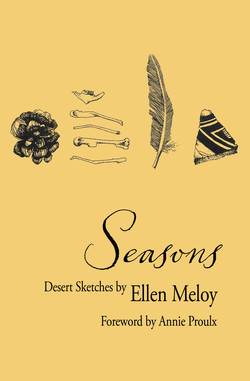Читать книгу Seasons - Ellen Meloy - Страница 12
На сайте Литреса книга снята с продажи.
ОглавлениеCalifornia
On a recent trip to California, I found myself stuck on a freeway. Three lanes of cars spewing exhaust, the fumes popping my few remaining brain cells like bubble wrap, nearly knocking me unconscious so that if the traffic ever did move again, I, slumped over the steering wheel, dripping stalactites of drool onto the rental car’s tasteful silver carpet, would incite gridlock anew, and the other drivers, their blood-streams raging with espresso, would hate me and start shooting.
The car ahead of me in this traffic jam was a BMW with an in-dash fax and Jacuzzi. Its bumper sticker said, “I’d rather be hunting and gathering.”
Californians dine by a sacred creed that says, “Eat fresh foods produced locally.” “We don’t shop at supermarkets,” they sniff. “We forage.” And it’s off to buy fetal zucchini from Buddhists, oysters shucked by the Holy Ghost, olives cured in the spittle of Himalayan puppies. Does anyone in the Golden State go hungry?
I cannot speak from experience because I grew up, and remain, well-fed. We were not a “think of starving children in China” kind of family, each meal dredged in béchamel and guilt. The Great Depression was my parents’ tribal history. They understood necessity and never used hunger as punishment. They never sent us to our rooms without dinner—only without dessert.
If they served a lesson with the green beans, it was to appreciate my mother’s labors. While her peers tripped over their aprons in the post-war rush to convenience foods, my mother drew on an eclectic cuisine known in our household as “from scratch.” My young lips never touched orange squares of petro-cheese, smelted between two slabs of snow-white, inflatable bread.
Only as a young adult did I first see true hunger. At a city diner, I sat across the room from a shabby vagrant who was nursing a cup of coffee, the only food he could afford. When he thought no one was looking, he uncapped the bottle of ketchup set among the table condiments and drank it down like a cold beer. A vegetarian obviously.
Today’s gourmet snobbery bears a curious irony. Paté and meat pies, once the fare of peasants, now melt the palates of the affluent, who scorn Spam and pre-whipped substances made with the oil-based flavors we fought Iraq for. The food elite have adopted the cuisine of the poor, but they have left the poor with the ketchup bottle.
To irony, add the illusion that we can hunt and gather, that we can live off the land and eat food close to the source. Not too many people remember what the source is. Not much of either source or land is left. Imagine everyone in Provo foraging. Imagine yourself wringing the necks of chickens or grappling with bleeding, bleating goats.
What if, like the bumper sticker said, I truly had to hunt and gather? I would see more songbird and reptile on my plate. I could clobber great blue herons and loot passing RVs. Around me lies the perfect “from scratch” cuisine: bunny linguine, baked meadowlarks, the neighbor’s kittens. Eat your pets!
May 29, 1998
